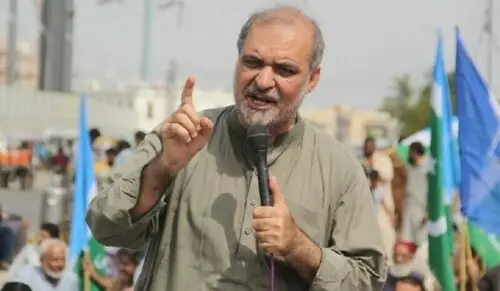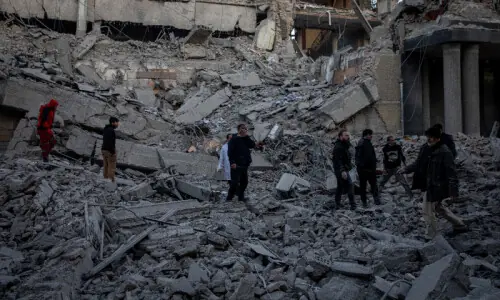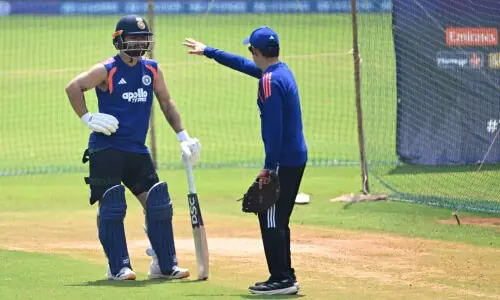Major General Aboobaker Osman Mitha remains a legend in the Pakistan Army. His aptly named memoir Unlikely Beginnings A soldier's life begins with a childhood spent in the lap of luxury, as far removed from the rigours of the military as could be. Kismet, however took him to the epitome of military enterprise through the raising of the famed Special Services Group (SSG) of the Pakistan Army.
His book is an engaging account of interest to all readers; military officers, students of history, students of politics and the average reader interested in learning of triumph and the personal cost it exacts.
Maj Gen Mitha gives a very animated account of life in Malabar Hill — his family home which housed about 100 people in all, including the domestic help. His description of life as the grandson of Sir Suleman Cassim Mitha, a politically active business tycoon who was the leader of the influential Bombay Muslims, including his own Memon community, is a fascinating read.
The affluent Muslim family whose men hosted dinners for the governor and moved in exalted circles but married barely literate women, was rife with political intrigues, insular thoughts and myopic worldviews. The husbands and fathers were thus distant in their relations with other members of the household.
Although the author does not express it as such and perhaps it may not even have occurred to him, but his decision to join the army was probably spurred by the influence of Lt. Col. Jelal Shah, a doctor in the British Indian Army and the father of his close school friend Moochool, who provided fatherly guidance and support to a youthful Mitha.
Maj Gen Mitha's colonial schooling shaped his character and for his higher senior Cambridge education he joined a military school which ultimately preparing him for the military academy.
All through his school years and during his army training the colonial angle seems to be a sore thumb in the life of the bright young boy from an elite Indian family.
Even the low ranking staff from amongst the ruling British imposed their colonial superiority on all Indians — even those who served with them in the army as officers. Mitha's identity seems to have evolved as a result of his growing realisation of pride hurt by colonialism.
As a young officer his experience of the 1943 Bengal famine left him deeply disturbed for years to come. He saw action in WWII as a paratrooper and it was this experience that was to come handy in raising the SSG for the Pakistan Army many years later.
Leaving behind his family and cherished friends, Mitha opted for Pakistan in 1947. He was barely 24 years old at the time. His future wife, Mrs Indu Mitha, also left everything behind in India to come to Pakistan four years later — when he took just four days off from his crucial staff college training to get married in Karachi.
The sacrifices that the couple made for their new country are not named but can be gauged from the various incidences mentioned in the book.
Maj Gen Mitha held many important positions within the GHQ. In 1956 he was assigned the task of founding the SSG, which would eventually make him a legend within the military. The unit was being raised with technical and material assistance from the American Army.
In Mitha's opinion this was a CIA plan to prepare a stay-behind unit in Pakistan in view of the Russian threat. The army chief Gen Yahya gave a freehand to then Lt. Col. Mitha to raise the SSG in collaboration with the Americans in Cherat.
Mitha combined military skill with personal integrity to manage the Pakistani and American officers, skillfully preserving the dignity of the Pakistani officers vis-Ã -vis the lavish lifestyle of the Americans. He managed to maintain the highest level of discipline by elegantly intertwining command and camaraderie.
He exhibited similar superior skills as Commandant of the Pakistan Military Academy from 1966 to 1968, when he added considerably to the intellectual, moral and physical development of the under-training cadets. The reader however, cannot help but get the impression from the author's writing that this positive legacy was mostly undone later in favour of personal ease.
In 1969 Mitha was appointed chairman of the National Police Commission. In this capacity he surveyed and recommended police reforms, which too never saw the light of day.
Maj Gen Mitha's account of his role during the ill-fated 1971 war is extremely educational. In 1970 he was appointed QMG (Quarter Master General) which involved the responsibility of logistics, later including wartime logistics. He was briefly involved in the army operation in East Pakistan without being appointed to any official position.
He arrived in March 1971 to assist Gen Tikka Khan — when the latter took over Eastern Command after the previous commander Lt Gen Sahabzada Yaqub Khan resigned — and stayed on for a few weeks in East Pakistan. He helped to quell the atrocities being meted out by the increasingly disenchanted Bengalis.
Mitha's official responsibilities as QMG were restricted to logistical support. He asserts fulfilling his duty by pointing out to GHQ the inadequacy of man and materials in the advent of war in a report submitted as early as June 1971. His meritorious wartime conduct is supported by the award of Hilal-i-Jurrat conferred upon him for services in East Pakistan, an award that was later rescinded.
He claims that Pakistani intelligence reports of an impending attack by India were overlooked by those who later implicated him in the 1971 debacle, thereby exploiting the opportunity to further their personal quest for power.
The greatest tragedy has perhaps been the treatment meted out to Maj Gen Mitha after his retirement was announced on national television. His pension was withheld for seven years and his life was made very difficult.
Great injustice was done to a scrupulous and dedicated soldier who gave up everything to serve the country he opted for.
Unlikely Beginnings A soldier's life
By Major General A. O. Mitha
Oxford University Press, Karachi
ISBN 978-0-19-579413-7
500pp. Rs 695





























